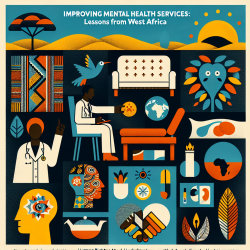Introduction
As speech-language pathologists, we are committed to using data-driven decisions to improve the lives of children. The research article "Advancing rare disease policy in Latin America: a call to action" provides valuable insights that can enhance our practice, especially when dealing with rare diseases. This blog will explore the key findings of the research and offer practical recommendations for practitioners to implement these insights effectively.
Understanding the Research
The study highlights the challenges faced by individuals with rare diseases in Latin America, where a lack of standardized definitions and inadequate policies hinder access to necessary care. The research emphasizes the need for unified definitions, improved public policies, and increased awareness among healthcare professionals.
Key Recommendations for Practitioners
- Educate and Advocate: Practitioners should educate themselves and others about rare diseases. Staying informed about the latest research and policy changes can enhance advocacy efforts for better care and resources.
- Collaborate with Advocacy Groups: Engage with patient advocacy groups to understand the specific needs of individuals with rare diseases. Collaborations can lead to better support systems and resources for affected families.
- Implement Evidence-Based Practices: Utilize evidence-based practices in therapy sessions to address the unique challenges faced by children with rare diseases. Tailoring interventions to individual needs is crucial for effective outcomes.
- Promote Awareness: Conduct workshops and seminars to raise awareness about rare diseases among peers and the community. Increased awareness can lead to early diagnosis and intervention, improving the quality of life for affected individuals.
Encouraging Further Research
The study calls for further research to develop comprehensive policies and support systems for rare diseases. Practitioners can contribute by participating in research initiatives, sharing clinical experiences, and collaborating with researchers to gather valuable data.
Conclusion
By implementing the recommendations from the research, practitioners can play a vital role in improving outcomes for children with rare diseases. It is essential to stay informed, collaborate with advocacy groups, and promote awareness to create a supportive environment for affected individuals and their families.
To read the original research paper, please follow this link: Advancing rare disease policy in Latin America: a call to action.










